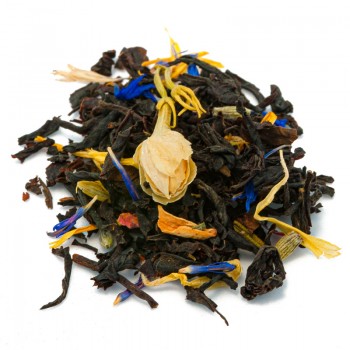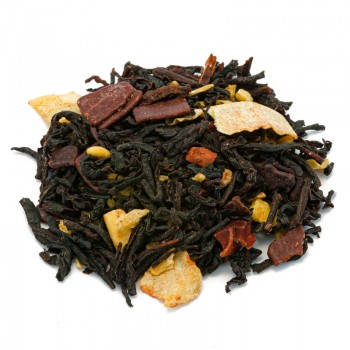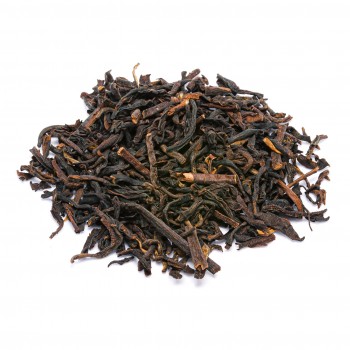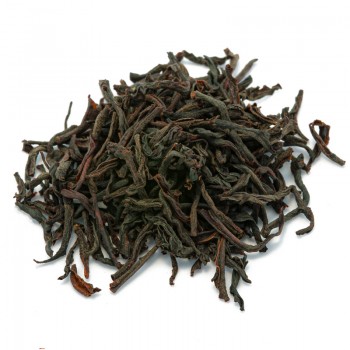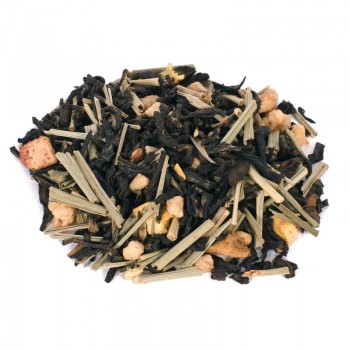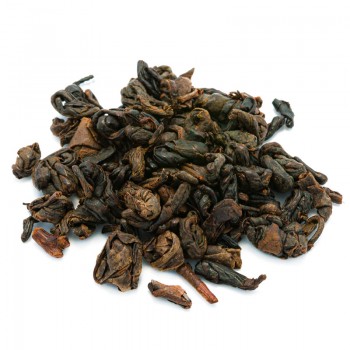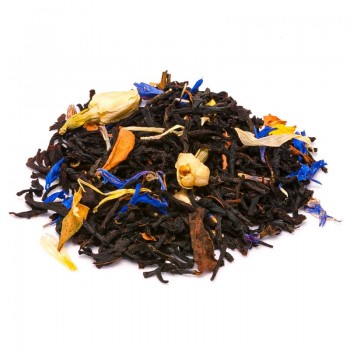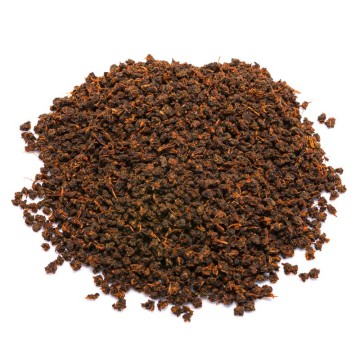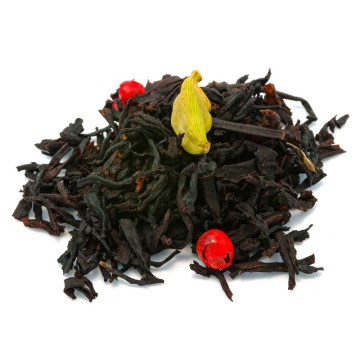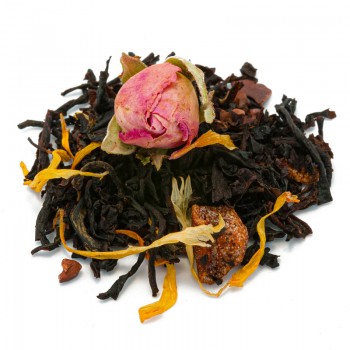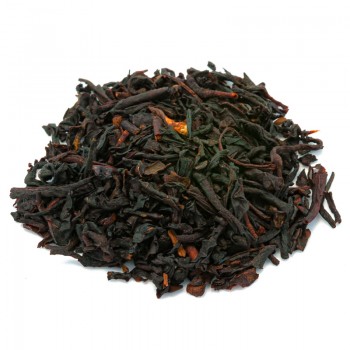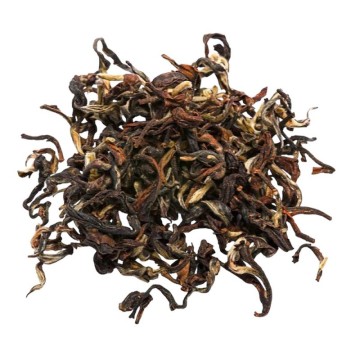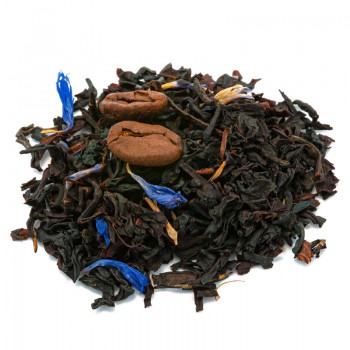A delicious combination of fruity black tea, which contains the lively flavours and aromas of blueberries and raspberries - an engaging experience for the nose and the palate. The notes of berries are combined with the light floral nuances of peony petals and pomegranate flowers, which blend perfectly for a sweet and satisfying tea.
It is also a delight for the eyes, with the dark tea contrasting the liveliness of the peony petals and cranberries,
Excellent as an iced tea in summer, with a pinch of sugar for a fruity and refreshing drink; it can be enjoyed hot when you want an enveloping and inebriating aroma.
Black tea blueberry and pomegranate: the combination of properties and benefits
This exceptional combination in flavour is also a source of well-being, for its antioxidant content. Both black tea leaves and blueberries and raspberries contain antioxidant polyphenols and minerals, nutrients that help our body to counteract the damage of cellular oxidation and aging.
The black tea, pomegranate and blueberry blend also has useful properties for draining excess fluids thanks to its diuretic and purifying effect. The polyphenols contained in this tea help to counteract water retention and the feeling of bloating.
This black tea blend is also useful for facilitating normal intestinal function, promoting the development of healthy bacteria in the intestine and the correct transit of food at the gastrointestinal level. It has a light laxative action, balanced by the astringent and soothing properties of blueberry and pomegranate flowers.
On an energetic level, black tea contains caffeine (theine) and therefore has a tonic function, stimulating to improve attention and concentration against tiredness. Furthermore, thanks to the energy contribution of caffeine, it supports physical performance, stimulating the metabolism and facilitating the burning of fat - an aid for balancing body weight.
This action that facilitates a healthy and balanced diet, is also enhanced by the "satiating" effect of the blend of black tea, pomegranate and blueberry, which with its natural sweetness can help counteract the stimulus of hunger. Nutritional values of Black Tea Black tea contains powerful groups of polyphenols including epigallocatechin gallate, theaflavins, thearubigins, and various other catechins or antioxidant flavonoids. It makes nutrients available such as some B vitamins, minerals (fluoride, calcium, zinc, magnesium and potassium), tannins and amino acids, including L-theanine. Furthermore, it contains alkaloids including caffeine (theine), theobromine and theophylline. Black tea pomegranate and blueberry where to buy it This particular combination of tea, fruits and flowers, you can find it in our online tea shop Natura d'Oriente. We select the loose leaves and other aromatic ingredients, according to high quality and taste criteria. As in the case of this blend of black tea pomegranate and blueberry, which you can find on sale available in convenient freshness-preserving packs of 25 g, 50 g, 75 g, 100 g, 150 g, 300 g. How to make the black tea pomegranate and blueberry infusion To prepare this black tea, place in a cup (250 ml), the water between 90 and 95 °C. Infuse 3 to 5 grams of the mixture, for a time of 3 to 5 minutes. Where does black tea come from and how is it obtained? Like any type of tea, even dark or black tea, comes from the Camellia sinensis plant. The difference between the various types of tea depends on the processing of the leaves, and in the case of black tea by a process of complete oxidation, discovered and implemented later than other types of tea. The origins of black tea date back to the Chinese Ming dynasty (1368-1644), a period in which producers began to experiment with different methods of processing tea leaves. One of these methods involved oxidizing the leaves for a longer period of time, which gave rise to a tea with a darker color and a more intense flavor. It became known as hong cha, or "red tea" in Chinese, which is also linked to a legend in which the discovery occurred by chance, when the leaves were left in the air and then smoked for unpredictable needs. Once the method was perfected, different stages of production of black tea were developed: withering the freshly picked leaves, rolling, oxidation and drying. Oxidation is crucial as it defines the character of black tea, thanks to the chemical reactions of the leaves. In the presence of oxygen, the enzymes contained in the leaves react with the polyphenols, generating compounds that define the color and flavor of tea. The idea of flavoring black tea with floral or fruit ingredients is also ancient, and when the tea trade began to the West, little by little blends began to be created. Up to the modern ones, whichinclude combinations such as black tea pomegranate and blueberry. Black tea contraindications Although tea consumption is considered safe for adults, some effects should be kept in mind, due to the caffeine content of black tea. It can be problematic for people sensitive to this alkaloid, or if consumed in excessive doses. Excessive caffeine intake can cause side effects such as nausea, nervousness and difficulty sleeping, palpitations, stomach pain, diarrhea. To avoid reactions to caffeine, it is useful to keep black tea intake at moderate levels (1-2 cups per day).

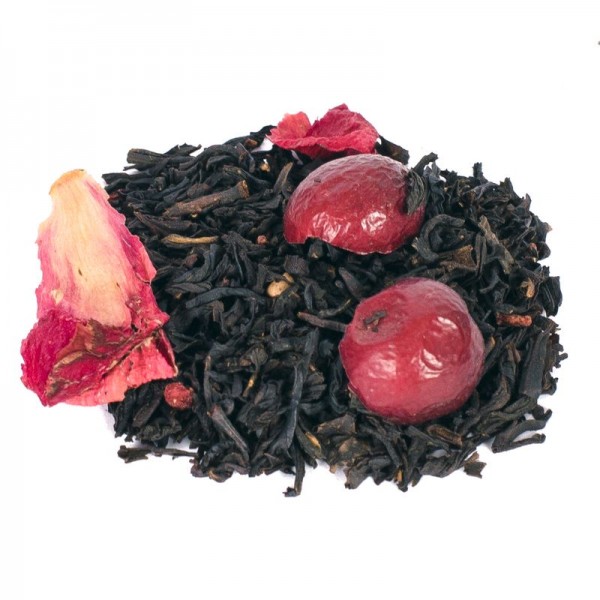









 No reward points for this product.
No reward points for this product.
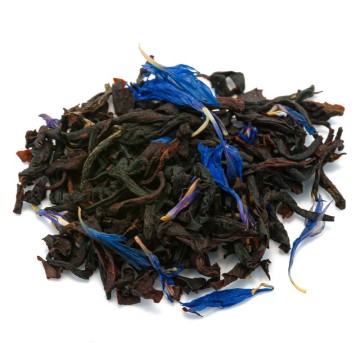
![black tea Irish Rum [Natura d'Oriente]](https://www.naturadoriente.com/3388-home_default/black-tea-irish-rum-.jpg)
